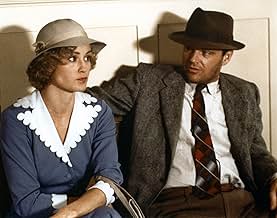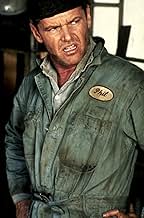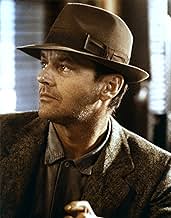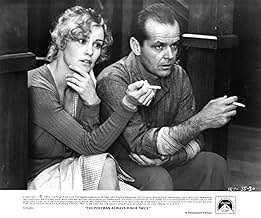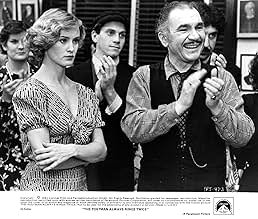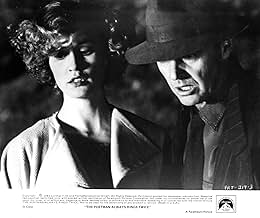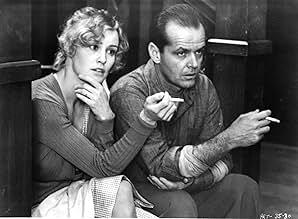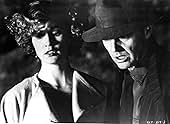CALIFICACIÓN DE IMDb
6.6/10
27 k
TU CALIFICACIÓN
La sensual esposa del dueño de un restaurante de carretera y un vagabundo desarraigado comienzan una aventura sórdida y lujuriosa y conspiran para asesinar a su marido griego.La sensual esposa del dueño de un restaurante de carretera y un vagabundo desarraigado comienzan una aventura sórdida y lujuriosa y conspiran para asesinar a su marido griego.La sensual esposa del dueño de un restaurante de carretera y un vagabundo desarraigado comienzan una aventura sórdida y lujuriosa y conspiran para asesinar a su marido griego.
- Dirección
- Guionistas
- Elenco
- Premios
- 1 premio ganado y 2 nominaciones en total
Thomas Hill
- Barlow
- (as Tom Hill)
- Dirección
- Guionistas
- Todo el elenco y el equipo
- Producción, taquilla y más en IMDbPro
Opiniones destacadas
A remake of the 1946 film, this version features Jack Nicholson and Jessica Lange, with a momentous white hot chemistry that can't possibly sustain itself but affords a memorable scene in the restaurant kitchen about ten minutes into the film which leads to the eventual plot to do in her older Greek husband. A story wherein neither would have the nerve to do such a thing alone, but together they make a job of it on one of the darkest nights and darkest rural roads ever. The trial for the murder features another couple of great performances by Michael Lerner as the resourceful to a fault defense attorney (if you were on trial for your life, you'd want this guy for a lawyer), and his investigator who becomes a menacing presence later in the film, played by John P Ryan. Very nicely photographed in color, it's set in the coastal hills and valleys north of LA, dotted with live oaks and capturing the rich earthy tones of the late afternoon golden hued hillsides that nicely contrast with the desperate story of the two lovers.
I must admit I was quite impressed with Bob Rafelson's adaptation of the depression era novel, "The Postman Always Rings Twice". Jack Nicholson plays Frank, a vagabond who eventually falls in love with a sexy waitress named Cora,played by Jessica Lange, who reciprocates this love. However, there is one problem standing in the way: Cora is married, unhappily married, but married nonetheless.
Aside from an intriguing story, "The Postman Always Rings Twice" is a wonderfully put together film, as Rafelson does a splendid job delving into the characters and their relationships, as well as examining the problems associated with forbidden love. As a viewer, you truly feel the passion between Lange and Nicholson,(who both won academy award nominations), and you almost feel for their pain. In the 1930's women in America were at quite a different position than they are today. They were expected to stay with the husband no matter what the circumstances, as divorce was quite uncommon. Lange was very convincing as this trapped 30's woman who eventually broke free the only way she knew possible..
I definitely recommend "The Postman Always Rings Twice" for any fan of entertaining and thought-provoking movies. Although the character development is not quite as extensive as some of Rafelson's early work, particularly the 1971 classic "Five Easy Pieces", the movie combines an intriguing screenplay with superb acting to make its own statement.
Aside from an intriguing story, "The Postman Always Rings Twice" is a wonderfully put together film, as Rafelson does a splendid job delving into the characters and their relationships, as well as examining the problems associated with forbidden love. As a viewer, you truly feel the passion between Lange and Nicholson,(who both won academy award nominations), and you almost feel for their pain. In the 1930's women in America were at quite a different position than they are today. They were expected to stay with the husband no matter what the circumstances, as divorce was quite uncommon. Lange was very convincing as this trapped 30's woman who eventually broke free the only way she knew possible..
I definitely recommend "The Postman Always Rings Twice" for any fan of entertaining and thought-provoking movies. Although the character development is not quite as extensive as some of Rafelson's early work, particularly the 1971 classic "Five Easy Pieces", the movie combines an intriguing screenplay with superb acting to make its own statement.
"The Postman Always Rings Twice" is the second American version of the famous James M. Cain novel and the fourth overall version. In addition, Émile Zola's story "Thérèse Raquin" clearly was more than just the inspiration for Cain, as it's so similar, too similar, to be coincidental. And the Zola novel has been made at least twenty or more times! So in other words, this 1981 film is a version of a story that's been made over and over and over again....to the point where you wonder why they keep making it!
As I watched this 1981 film, I was pleasantly surprised by one thing...it really does stick very closely to the novel. In many, many ways the characters are nothing like the overly sanitized Lana Turner/John Garfield version. Jack Nicholson's version of Frank is far nastier than the drifter played in the 1946 film. He has a prison record and isn't likable in the least. As for Cora, she's a lot kinkier than she was in earlier versions! In fact, in 1946 they simply couldn't have stuck too closely to the novel due to the tough Production Code...which prevented nudity and kinks from being included in films...and Cora really has some kinks in this film! So, at least it is a much more faithful version of the story...albeit still yet one more version of the story. And this leads me to the important question...is it any good? Well, yes and no. The acting and production are pretty good and the story engaging...but it also is familiar (I know I've mentioned this OFTEN already) and the courtroom scene where Jessica Lange has her outburst is absolutely absurdly overacted. Still, not a bad little film.
As I watched this 1981 film, I was pleasantly surprised by one thing...it really does stick very closely to the novel. In many, many ways the characters are nothing like the overly sanitized Lana Turner/John Garfield version. Jack Nicholson's version of Frank is far nastier than the drifter played in the 1946 film. He has a prison record and isn't likable in the least. As for Cora, she's a lot kinkier than she was in earlier versions! In fact, in 1946 they simply couldn't have stuck too closely to the novel due to the tough Production Code...which prevented nudity and kinks from being included in films...and Cora really has some kinks in this film! So, at least it is a much more faithful version of the story...albeit still yet one more version of the story. And this leads me to the important question...is it any good? Well, yes and no. The acting and production are pretty good and the story engaging...but it also is familiar (I know I've mentioned this OFTEN already) and the courtroom scene where Jessica Lange has her outburst is absolutely absurdly overacted. Still, not a bad little film.
This remake of the 1946 film which starred Lana Turner and John Garfield is significantly better than its reputation. The script, adapted from James M. Cain's first novel, is by the award-winning playwright David Mamet, while the interesting and focused cinematography is by Sven Nykvist, who did so much exquisite work for Swedish director Ingmar Bergman. An excellent cast is led by Jack Nicholson and Jessica Lange, whose cute animal magnetism is well displayed. Bob Rafelson, who has to his directorial credit the acclaimed Five Easy Pieces (1970) and The King of Marvin Gardens (1972), both also starring Jack Nicholson, captures the raw animal sex that made Cain's novel so appealing (and shocking) to a depression-era readership and brings it up to date. Hollywood movies have gotten more violent and scatological since 1981, but they haven't gotten any sexier. This phenomenon is in part due to fears occasioned by the rise of AIDS encouraged by the usual blue stocking people. Don't see this movie if sex offends you.
Lange is indeed sexy and more closely fits the part of a lower-middle class woman who married an older man, a café owner, for security than the stunning blonde bombshell Lana Turner, who was frankly a little too gorgeous for the part. John Colicos plays the café owner, Nick Papadakis, with clear fidelity to Cain's conception. In the 1946 production, the part was played by Cecil Kellaway, who was decidedly English; indeed they changed the character's name to Smith. Also changed in that production was the name of the lawyer Katz (to Keats). One wonders why. My guess is that in those days they were afraid of offending Greeks, on the one hand, and Jews on the other. Here Katz is played by Michael Lerner who really brings the character to life.
Jack Nicholson's interpretation of Cain's antihero, an ex-con who beat up on the hated railway dicks while chasing any skirt that came his way, the kind of guy who acts out his basic desires in an amoral, animalistic way, was not entirely convincing, perhaps because Nicholson seems a little too sophisticated for the part. Yet, his performance may be the sort better judged by a later generation. I have seen him in so many films that I don't feel I can trust my judgment. My sense is that he's done better work, particularly in the two films mentioned above and also in Chinatown (1974), One Flew Over the Cuckoo's Nest (1975) and such later works as The Shining (1980) and Terms of Endearment (1983).
The problem with bringing Postman successfully to the screen is two-fold. One, the underlying psychology, which so strongly appealed to Cain's depression-era readership, is not merely animalistic. More than that it reflects the economic conflict between the established haves, as represented by the greedy lawyers, the well-heeled insurance companies, the implacable court system and the simple-minded cops, and to a lesser degree by property owner Nick Papadakis himself, and the out of work victims of the depression, the have-nots, represented by Frank and Cora (who had to marry for security). Two--and this is where both cinematic productions failed--the film must be extremely fast-paced, almost exaggeratedly so, to properly capture the spirit and sense of the Cain novel. Frank and Cora are rushing headlong into tragedy and oblivion, and the pace of the film must reflect that. A true to the spirit adaptation would require a terse, stream-lined directorial style with an emphasis on blind passions unconsciously acted out, something novelist Cormac McCarthy might accomplish if he directed film. I think that Christopher Nolan, who directed the strikingly original Memento (2000) could do it.
For further background on the novel and some speculation on why it was called "The Postman Always Rings Twice" (Cain's original, apt title was "Bar-B-Que") see my review at Amazon.com.
(Note: Over 500 of my movie reviews are now available in my book "Cut to the Chaise Lounge or I Can't Believe I Swallowed the Remote!" Get it at Amazon!)
Lange is indeed sexy and more closely fits the part of a lower-middle class woman who married an older man, a café owner, for security than the stunning blonde bombshell Lana Turner, who was frankly a little too gorgeous for the part. John Colicos plays the café owner, Nick Papadakis, with clear fidelity to Cain's conception. In the 1946 production, the part was played by Cecil Kellaway, who was decidedly English; indeed they changed the character's name to Smith. Also changed in that production was the name of the lawyer Katz (to Keats). One wonders why. My guess is that in those days they were afraid of offending Greeks, on the one hand, and Jews on the other. Here Katz is played by Michael Lerner who really brings the character to life.
Jack Nicholson's interpretation of Cain's antihero, an ex-con who beat up on the hated railway dicks while chasing any skirt that came his way, the kind of guy who acts out his basic desires in an amoral, animalistic way, was not entirely convincing, perhaps because Nicholson seems a little too sophisticated for the part. Yet, his performance may be the sort better judged by a later generation. I have seen him in so many films that I don't feel I can trust my judgment. My sense is that he's done better work, particularly in the two films mentioned above and also in Chinatown (1974), One Flew Over the Cuckoo's Nest (1975) and such later works as The Shining (1980) and Terms of Endearment (1983).
The problem with bringing Postman successfully to the screen is two-fold. One, the underlying psychology, which so strongly appealed to Cain's depression-era readership, is not merely animalistic. More than that it reflects the economic conflict between the established haves, as represented by the greedy lawyers, the well-heeled insurance companies, the implacable court system and the simple-minded cops, and to a lesser degree by property owner Nick Papadakis himself, and the out of work victims of the depression, the have-nots, represented by Frank and Cora (who had to marry for security). Two--and this is where both cinematic productions failed--the film must be extremely fast-paced, almost exaggeratedly so, to properly capture the spirit and sense of the Cain novel. Frank and Cora are rushing headlong into tragedy and oblivion, and the pace of the film must reflect that. A true to the spirit adaptation would require a terse, stream-lined directorial style with an emphasis on blind passions unconsciously acted out, something novelist Cormac McCarthy might accomplish if he directed film. I think that Christopher Nolan, who directed the strikingly original Memento (2000) could do it.
For further background on the novel and some speculation on why it was called "The Postman Always Rings Twice" (Cain's original, apt title was "Bar-B-Que") see my review at Amazon.com.
(Note: Over 500 of my movie reviews are now available in my book "Cut to the Chaise Lounge or I Can't Believe I Swallowed the Remote!" Get it at Amazon!)
This novel adaptation was the second after a first movie in the 1940s. This one retains the period setting but ups the ante in terms of sexual content, featuring one of the most explicit sex scenes ever shown in a mainstream film which goes far further than any film before - or since.
The plot is simple in the extreme: the wife of a Greek man who runs his own diner, bored and neglected by her husband, begins a torrid affair with a drifter her husband employs as his mechanic. From there on in, the story gradually develops in often fascinating ways as the two lovers realise that only one thing's stopping their happiness: her husband.
The film is shot through with a grim and gritty emphasis, best realised by Nicholson's grubby mechanic. He's nobody's idea of a sex symbol, although Jessica Lange is quite ravishing as the object of his attentions. This focus on realism over Hollywood fantasy is what makes the film so watchable and, in places, uncomfortable as it becomes clear that the lovers have something of a sado-masochistic relationship.
Things move into courtroom-drama territory later on (featuring some terrific acting work from Michael Lerner as the lawyer) whilst handing a number of blink-and-you'll-miss-em minor parts to familiar faces (John P. Ryan as a blackmailer, Angelica Houston as - bizarrely - a circus owner, cult favourite Don Calfa as a circus hand, Brion James as a thug and Christopher Lloyd as a salsman).
I found the film to be sometimes compelling and never boring. It's one of those films you watch to find out just what happens to the central characters, a curiosity bolstered by the feeling that they're never going to unentangle themselves from this mess. Come the surprise climax, well...you'll have to see for yourself.
The plot is simple in the extreme: the wife of a Greek man who runs his own diner, bored and neglected by her husband, begins a torrid affair with a drifter her husband employs as his mechanic. From there on in, the story gradually develops in often fascinating ways as the two lovers realise that only one thing's stopping their happiness: her husband.
The film is shot through with a grim and gritty emphasis, best realised by Nicholson's grubby mechanic. He's nobody's idea of a sex symbol, although Jessica Lange is quite ravishing as the object of his attentions. This focus on realism over Hollywood fantasy is what makes the film so watchable and, in places, uncomfortable as it becomes clear that the lovers have something of a sado-masochistic relationship.
Things move into courtroom-drama territory later on (featuring some terrific acting work from Michael Lerner as the lawyer) whilst handing a number of blink-and-you'll-miss-em minor parts to familiar faces (John P. Ryan as a blackmailer, Angelica Houston as - bizarrely - a circus owner, cult favourite Don Calfa as a circus hand, Brion James as a thug and Christopher Lloyd as a salsman).
I found the film to be sometimes compelling and never boring. It's one of those films you watch to find out just what happens to the central characters, a curiosity bolstered by the feeling that they're never going to unentangle themselves from this mess. Come the surprise climax, well...you'll have to see for yourself.
¿Sabías que…?
- TriviaDavid Mamet's first screenplay.
- ErroresModern-day paper currency is used in craps game set during Great Depression, instead of silver certificate dollar bills then in use.
- Citas
Cora: I gotta have you, Frank. If it was just us. If it was just you and me.
Frank Chambers: What are you talking about?
Cora: I'm getting tired of what's right and wrong.
Frank Chambers: They hang people for that, Cora.
- Versiones alternativasCBS edited 30 minutes from this film for its 1986 network television premiere.
- ConexionesEdited into American Cinema: Film Noir (1995)
Selecciones populares
Inicia sesión para calificar y agrega a la lista de videos para obtener recomendaciones personalizadas
- How long is The Postman Always Rings Twice?Con tecnología de Alexa
Detalles
- Fecha de lanzamiento
- Países de origen
- Idiomas
- También se conoce como
- El cartero siempre llama dos veces
- Locaciones de filmación
- Barnsdall Rio Grande Service Station, Goleta, California, Estados Unidos(Cora and a Drunk Nick and Frank get Fuel)
- Productoras
- Ver más créditos de la compañía en IMDbPro
Taquilla
- Presupuesto
- USD 12,000,000 (estimado)
- Total en EE. UU. y Canadá
- USD 12,376,625
- Total a nivel mundial
- USD 12,383,416
Contribuir a esta página
Sugiere una edición o agrega el contenido que falta


